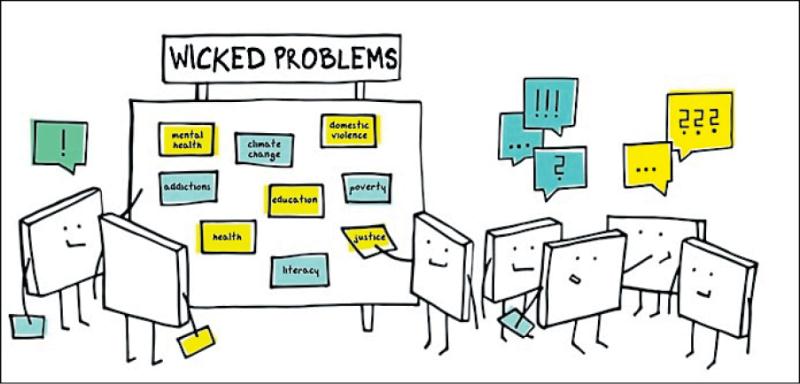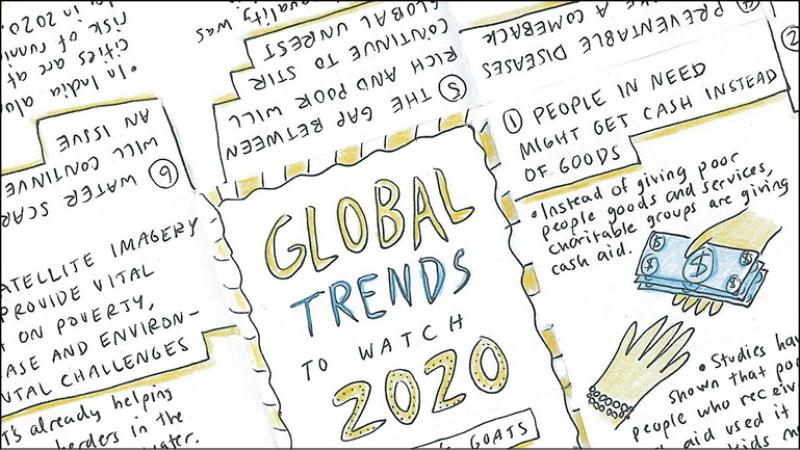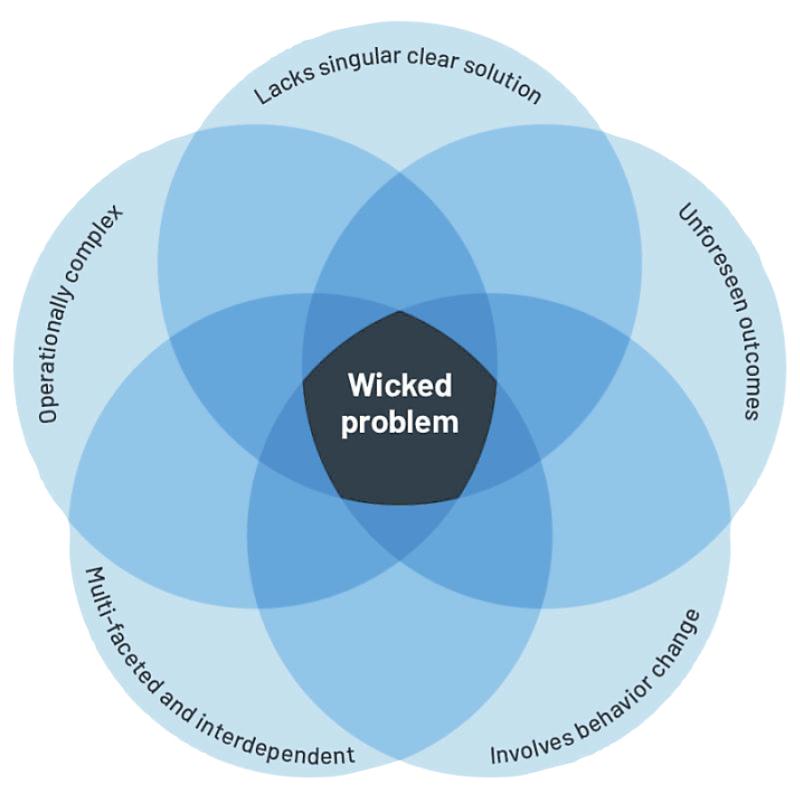The pandemic has drastically changed the way the world works over the past few months, bringing a global need to adopt new trends and think outside the box, at a faster rate for a lower cost. This sparked what is known to be as a “wicked problem”, which is: “How do organisations and people continue and sustain despite deflating economies at a time when human capital is losing its value as an asset?”
Before we explore how the pandemic is shaping the future of our world, let’s first understand what a wicked problem and wicked opportunity is.
What is a ‘wicked problem’ and ‘wicked opportunity’?

A wicked problem is a social, cultural, or sometimes even an organisational problem that is difficult or impossible to solve, in contrast to a “tame” problem, which might be very hard but can be solved with straightforward techniques if given enough time. The reasons why something could be a wicked problem may be due to incomplete or contradictory knowledge, the number of stakeholders and opinions involved, large economic burdens, and even the interconnected nature of these problems with other problems.
Wicked opportunities are when these same problems are tackled as opportunities, rather than problems. This transformation and effort to tackle issues are often done by a network of non-governmental organisations (NGOs), social entrepreneurs, governments, and big businesses.
Unprecedented changes
Unlike the steady growth and innovation trajectory of the Silicon Valley in the West, the East has an absence of that Western idealism and innovation. For example, Singapore has more of a Global 100 company structure, with measures and processes for growth, but slow growth. Malaysia and Indonesia are much more unstructured and do not have much fire in the belly when compared to Singapore, and countries like Myanmar have their dynamic, just like Sri Lanka which is seen as a destination with heavy island culture. Despite Covid-19 hitting the world and a lot of unprecedented changes taking place, including changes in people’s daily lifestyle and the complete stopping of travel, some things are coming to a full stop, some things are slowing down, and some things are speeding up, even more, and the growth didn’t stop.
Innovation in times of uncertainty

The pandemic was starting to impact the “price-performance curve” resulting in essential work needing to be done differently. Companies like Deloitte for example, which rely heavily on audits – which in turn relies heavily on manpower to be executed – had to be changed from its all-time accepted way of doing things. This in a sense created a “wicked problem” and Deloitte’s take on this was a “wicked opportunity” to start using drones which helps the work get done faster, better, and at a lower cost, increasing their profit margins over time. And the auditors? Have them reassigned to new tasks and roles of business operations.
Even though the pandemic is disrupting economies around the world, it won’t be creating an equal spread of these impacts across industries. Certain industries including travel, hospitality, consumer products, and other industries that are dependent on manpower will be affected the most whilst certain industries relating to technology will see growth in the coming years. The presence of the pandemic saw a shift in the way work is done, and despite its negative effects, the pandemic propelled the world to accelerate the introduction of the technology of 2025 in 2020. A wicked problem brought about the chance for wicked opportunities, which allowed technology, innovation, and workforce to grow.
With the pandemic shaping the future of the way in which we do work, consumers will see an increase in government spending, a cosmic shift in power and energy industries, and the speeding up of the tech industry. Whilst large global companies such as Apple, Microsoft, and Alibaba are projected to have an increase in their market share already, economies and businesses that are hit harder may need to re-evaluate about investing and realign their businesses by diversifying into other industries, while other industries gear for shifts.

The future of tech is now
With the pandemic speeding up the expansion of the tech industry, it’s now high time for the introduction of much-needed technology; some of these being allowing payments to be more accessible as there is a growing trend to use less and less cash since consumers are moving towards mobile payments, the healthcare industry allowing remote doctor channeling and medical prescriptions as patients will not see a need to physically step into a hospital unless necessary, and the shift for sustainability and new energy sources with the growing concerns about global warming.
This new shift will see a demand for startups, sparking entrepreneurship, and established companies to keep exploring trends and be innovative.
Putting in this effort will also see companies take a shift towards a co-op model, where equity is shared amongst people who put in the labour – and startups will be the pioneers to adopt this trend. A lesson learnt through the pandemic is that the underlying growth which drove exponential technologies didn’t slow down, and in fact, technologies that were to be introduced in the future are being introduced now.
Companies and people alike need to start making a change and gear for the changes of tomorrow that need to be introduced today.
This article was written based on a discussion with Duleesha Kulasooriya on the Hatch Global platform. Duleesha is the lead strategist for Deloitte’s Centre for the Edge – a Silicon Valley-based management research institute exploring the edges of business and technology. Over the past decade, they have explored how the world is changing in very dramatic ways as a result of ever-evolving digital infrastructure and liberalising public policy, and its implications to us as individuals and institutions.Hatch Global is an international platform hosted by Hatch together with its global partners to enable startups to receive the necessary assistance to grow. Making up the “Hatch Global” brand is Hatch, the place for innovation, growth, collaboration, and the centre of gravity for all things startups in Sri Lanka. The global partners include BTC ventures – a Bangladeshi firm that allows startup founders to kickstart their ideas by providing them technical support to validate a product or solution and seed fund for a faster go-to market; a Pakistani venture, Seed Ventures – a social entrepreneurship and equity development organisation to help support and promote entrepreneurship across various landscapes and verticals; and finally, ProPakistani – Pakistan’s largest publisher for tech and business news.
 By Hatch
By Hatch A wicked problem is a social, cultural, or sometimes even an organisational problem that is difficult or impossible to solve, in contrast to a “tame” problem, which might be very hard but can be solved with straightforward techniques if given enough time. The reasons why something could be a wicked problem may be due to incomplete or contradictory knowledge, the number of stakeholders and opinions involved, large economic burdens, and even the interconnected nature of these problems with other problems.
Wicked opportunities are when these same problems are tackled as opportunities, rather than problems. This transformation and effort to tackle issues are often done by a network of non-governmental organisations (NGOs), social entrepreneurs, governments, and big businesses.
Unprecedented changes
Unlike the steady growth and innovation trajectory of the Silicon Valley in the West, the East has an absence of that Western idealism and innovation. For example, Singapore has more of a Global 100 company structure, with measures and processes for growth, but slow growth. Malaysia and Indonesia are much more unstructured and do not have much fire in the belly when compared to Singapore, and countries like Myanmar have their dynamic, just like Sri Lanka which is seen as a destination with heavy island culture. Despite Covid-19 hitting the world and a lot of unprecedented changes taking place, including changes in people’s daily lifestyle and the complete stopping of travel, some things are coming to a full stop, some things are slowing down, and some things are speeding up, even more, and the growth didn’t stop.
Innovation in times of uncertainty
A wicked problem is a social, cultural, or sometimes even an organisational problem that is difficult or impossible to solve, in contrast to a “tame” problem, which might be very hard but can be solved with straightforward techniques if given enough time. The reasons why something could be a wicked problem may be due to incomplete or contradictory knowledge, the number of stakeholders and opinions involved, large economic burdens, and even the interconnected nature of these problems with other problems.
Wicked opportunities are when these same problems are tackled as opportunities, rather than problems. This transformation and effort to tackle issues are often done by a network of non-governmental organisations (NGOs), social entrepreneurs, governments, and big businesses.
Unprecedented changes
Unlike the steady growth and innovation trajectory of the Silicon Valley in the West, the East has an absence of that Western idealism and innovation. For example, Singapore has more of a Global 100 company structure, with measures and processes for growth, but slow growth. Malaysia and Indonesia are much more unstructured and do not have much fire in the belly when compared to Singapore, and countries like Myanmar have their dynamic, just like Sri Lanka which is seen as a destination with heavy island culture. Despite Covid-19 hitting the world and a lot of unprecedented changes taking place, including changes in people’s daily lifestyle and the complete stopping of travel, some things are coming to a full stop, some things are slowing down, and some things are speeding up, even more, and the growth didn’t stop.
Innovation in times of uncertainty
 The pandemic was starting to impact the “price-performance curve” resulting in essential work needing to be done differently. Companies like Deloitte for example, which rely heavily on audits – which in turn relies heavily on manpower to be executed – had to be changed from its all-time accepted way of doing things. This in a sense created a “wicked problem” and Deloitte’s take on this was a “wicked opportunity” to start using drones which helps the work get done faster, better, and at a lower cost, increasing their profit margins over time. And the auditors? Have them reassigned to new tasks and roles of business operations.
Even though the pandemic is disrupting economies around the world, it won’t be creating an equal spread of these impacts across industries. Certain industries including travel, hospitality, consumer products, and other industries that are dependent on manpower will be affected the most whilst certain industries relating to technology will see growth in the coming years. The presence of the pandemic saw a shift in the way work is done, and despite its negative effects, the pandemic propelled the world to accelerate the introduction of the technology of 2025 in 2020. A wicked problem brought about the chance for wicked opportunities, which allowed technology, innovation, and workforce to grow.
With the pandemic shaping the future of the way in which we do work, consumers will see an increase in government spending, a cosmic shift in power and energy industries, and the speeding up of the tech industry. Whilst large global companies such as Apple, Microsoft, and Alibaba are projected to have an increase in their market share already, economies and businesses that are hit harder may need to re-evaluate about investing and realign their businesses by diversifying into other industries, while other industries gear for shifts.
The pandemic was starting to impact the “price-performance curve” resulting in essential work needing to be done differently. Companies like Deloitte for example, which rely heavily on audits – which in turn relies heavily on manpower to be executed – had to be changed from its all-time accepted way of doing things. This in a sense created a “wicked problem” and Deloitte’s take on this was a “wicked opportunity” to start using drones which helps the work get done faster, better, and at a lower cost, increasing their profit margins over time. And the auditors? Have them reassigned to new tasks and roles of business operations.
Even though the pandemic is disrupting economies around the world, it won’t be creating an equal spread of these impacts across industries. Certain industries including travel, hospitality, consumer products, and other industries that are dependent on manpower will be affected the most whilst certain industries relating to technology will see growth in the coming years. The presence of the pandemic saw a shift in the way work is done, and despite its negative effects, the pandemic propelled the world to accelerate the introduction of the technology of 2025 in 2020. A wicked problem brought about the chance for wicked opportunities, which allowed technology, innovation, and workforce to grow.
With the pandemic shaping the future of the way in which we do work, consumers will see an increase in government spending, a cosmic shift in power and energy industries, and the speeding up of the tech industry. Whilst large global companies such as Apple, Microsoft, and Alibaba are projected to have an increase in their market share already, economies and businesses that are hit harder may need to re-evaluate about investing and realign their businesses by diversifying into other industries, while other industries gear for shifts.
 The future of tech is now
With the pandemic speeding up the expansion of the tech industry, it’s now high time for the introduction of much-needed technology; some of these being allowing payments to be more accessible as there is a growing trend to use less and less cash since consumers are moving towards mobile payments, the healthcare industry allowing remote doctor channeling and medical prescriptions as patients will not see a need to physically step into a hospital unless necessary, and the shift for sustainability and new energy sources with the growing concerns about global warming.
This new shift will see a demand for startups, sparking entrepreneurship, and established companies to keep exploring trends and be innovative.
Putting in this effort will also see companies take a shift towards a co-op model, where equity is shared amongst people who put in the labour – and startups will be the pioneers to adopt this trend. A lesson learnt through the pandemic is that the underlying growth which drove exponential technologies didn’t slow down, and in fact, technologies that were to be introduced in the future are being introduced now.
Companies and people alike need to start making a change and gear for the changes of tomorrow that need to be introduced today.
This article was written based on a discussion with Duleesha Kulasooriya on the Hatch Global platform. Duleesha is the lead strategist for Deloitte’s Centre for the Edge – a Silicon Valley-based management research institute exploring the edges of business and technology. Over the past decade, they have explored how the world is changing in very dramatic ways as a result of ever-evolving digital infrastructure and liberalising public policy, and its implications to us as individuals and institutions.Hatch Global is an international platform hosted by Hatch together with its global partners to enable startups to receive the necessary assistance to grow. Making up the “Hatch Global” brand is Hatch, the place for innovation, growth, collaboration, and the centre of gravity for all things startups in Sri Lanka. The global partners include BTC ventures – a Bangladeshi firm that allows startup founders to kickstart their ideas by providing them technical support to validate a product or solution and seed fund for a faster go-to market; a Pakistani venture, Seed Ventures – a social entrepreneurship and equity development organisation to help support and promote entrepreneurship across various landscapes and verticals; and finally, ProPakistani – Pakistan’s largest publisher for tech and business news.
The future of tech is now
With the pandemic speeding up the expansion of the tech industry, it’s now high time for the introduction of much-needed technology; some of these being allowing payments to be more accessible as there is a growing trend to use less and less cash since consumers are moving towards mobile payments, the healthcare industry allowing remote doctor channeling and medical prescriptions as patients will not see a need to physically step into a hospital unless necessary, and the shift for sustainability and new energy sources with the growing concerns about global warming.
This new shift will see a demand for startups, sparking entrepreneurship, and established companies to keep exploring trends and be innovative.
Putting in this effort will also see companies take a shift towards a co-op model, where equity is shared amongst people who put in the labour – and startups will be the pioneers to adopt this trend. A lesson learnt through the pandemic is that the underlying growth which drove exponential technologies didn’t slow down, and in fact, technologies that were to be introduced in the future are being introduced now.
Companies and people alike need to start making a change and gear for the changes of tomorrow that need to be introduced today.
This article was written based on a discussion with Duleesha Kulasooriya on the Hatch Global platform. Duleesha is the lead strategist for Deloitte’s Centre for the Edge – a Silicon Valley-based management research institute exploring the edges of business and technology. Over the past decade, they have explored how the world is changing in very dramatic ways as a result of ever-evolving digital infrastructure and liberalising public policy, and its implications to us as individuals and institutions.Hatch Global is an international platform hosted by Hatch together with its global partners to enable startups to receive the necessary assistance to grow. Making up the “Hatch Global” brand is Hatch, the place for innovation, growth, collaboration, and the centre of gravity for all things startups in Sri Lanka. The global partners include BTC ventures – a Bangladeshi firm that allows startup founders to kickstart their ideas by providing them technical support to validate a product or solution and seed fund for a faster go-to market; a Pakistani venture, Seed Ventures – a social entrepreneurship and equity development organisation to help support and promote entrepreneurship across various landscapes and verticals; and finally, ProPakistani – Pakistan’s largest publisher for tech and business news.
